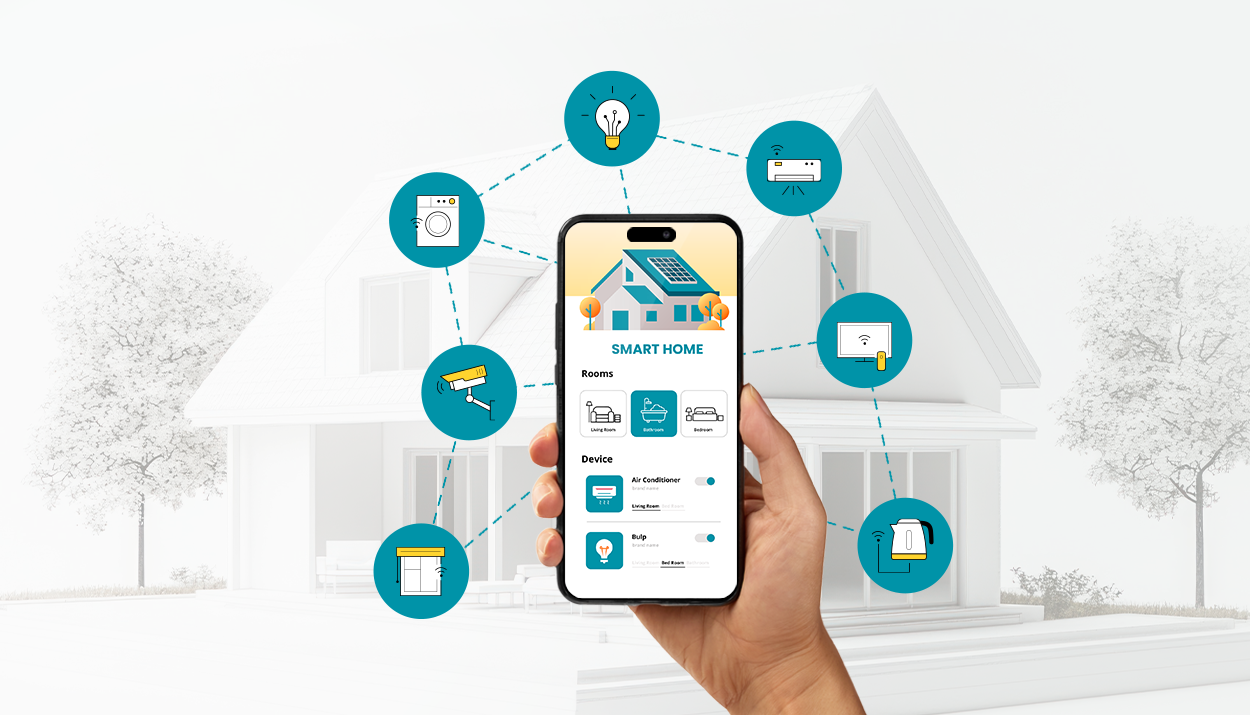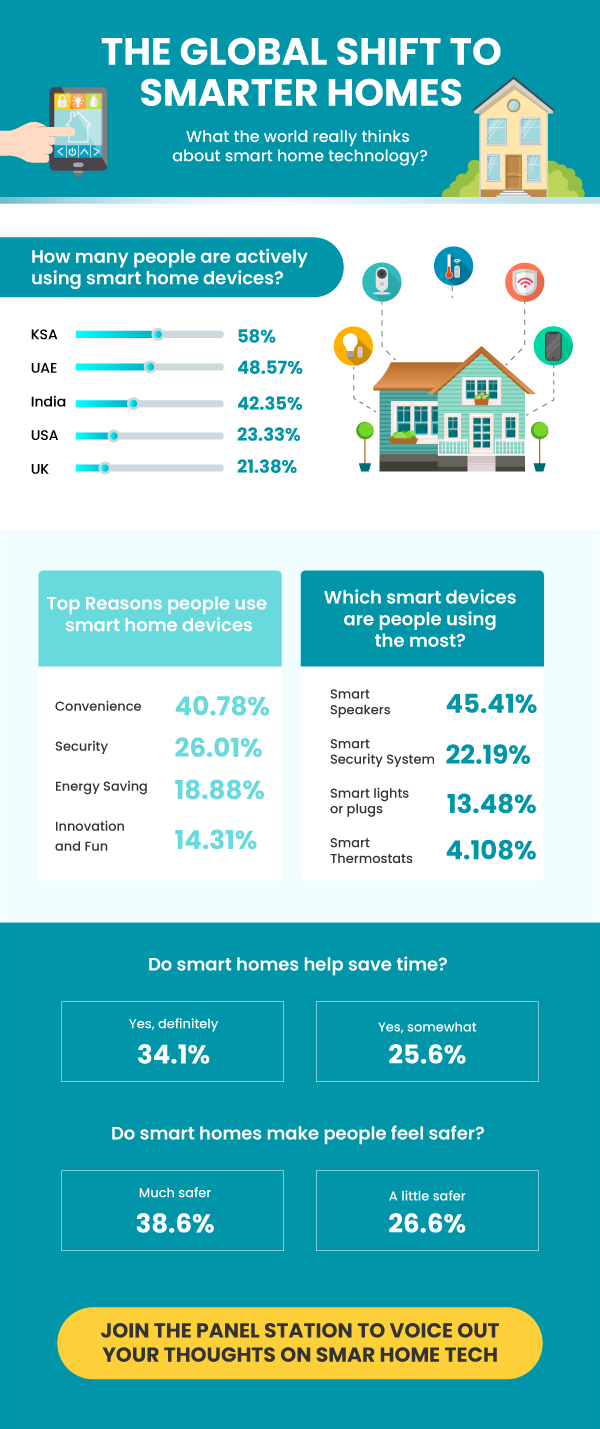Remember the last time you left for work wondering if you remembered to lock the front door after rushing the kids to school? Or came home to find the house freezing because someone forgot to adjust the thermostat during the morning chaos? As a parent, these everyday concerns used to be just another item on your never-ending mental checklist.
Not anymore. Smart home technology has quietly transformed from a luxury for tech enthusiasts into a game-changer for busy parents juggling work, family, and everything in between. And how parents are actually using these devices goes far beyond simple convenience.
At The Panel Station, we surveyed our global community across 40+ countries to uncover how families are embracing smart home technology. What we found reveals how these devices are reshaping modern parenting. Let’s take a deeper look.
Smart Home Technology: Which Countries are Leading the Charge
Around the world, modern home tech is reshaping how families manage daily life. But adoption rates vary significantly by country, with some regions embracing family-focused smart technology faster than others.
Saudi Arabia
In Saudi Arabia, smart homes aren’t just a luxury for families—they’re becoming essential parenting tools! With 58% of households using multiple devices, parents are leveraging the country’s excellent internet infrastructure to create safer, more efficient family environments.
Visit any new family home in Riyadh or Jeddah, and you’ll find built-in smart features like automated security systems that alert parents when kids arrive home, smart lighting that adjusts for bedtime routines, and climate control that maintains perfect temperatures for sleeping children.
United Arab Emirates
UAE families are living in the future of parenting technology! Whether you’re in a Dubai apartment or an Abu Dhabi villa, it’s rare to find a family home without smart devices helping manage household chaos.
What’s driving this enthusiasm among parents? Government initiatives promoting smart living, robust digital infrastructure, and a generation of parents who understand how technology can simplify family management and enhance child safety.
United States
In the US, 23.33% of families live in homes with multiple connected devices. What’s remarkable is how smart technology has spread across all types of families. From grandparents who use voice assistants to help with grandchildren to single parents who rely on smart security for peace of mind, these devices are becoming integral to modern family life.
United Kingdom
British families are taking a thoughtful approach to smart home adoption. Rather than overwhelming their homes with gadgets, UK parents are carefully selecting one or two devices that genuinely solve family problems – choosing smart living with purpose over flashy technology.
India
In India, 42.35% of families now use multiple smart devices at home. Urban families in cities like Mumbai and Bangalore are leading adoption, with parents using smart technology to monitor children’s safety and manage busy household schedules.
Interestingly, builders are now including family-friendly smart features in new developments, designing homes that are ready for modern parenting from day one.
Essential Smart Devices Every Parent Should Consider
While the smart home market offers countless gadgets, some devices have proven particularly valuable for families. Here are the top smart devices that parents around the world are using to make family life easier:
Smart Speakers
Amazon Echo and Google Nest have become the ultimate parenting assistants. With 45.42% of users ranking smart assistants as their #1 device, these speakers are revolutionizing how families manage daily routines.
For parents, smart speakers can:
- Set multiple timers for different activities (homework time, bath time, bedtime)
- Play educational content or bedtime stories
- Control other smart devices with voice commands when your hands are full
- Create family calendars and reminders for appointments and activities
- Provide quick answers to children’s endless questions
Smart Security
Video doorbells, motion sensors, and smart locks serve as digital guardians for your family. 24.14% of American households report smart security as their most valuable family technology.
Smart security helps parents by:
- Monitoring who’s at the door when children are home alone
- Sending alerts when kids arrive home from school
- Allowing remote door access for trusted caregivers
- Providing real-time video feeds of entry points
- Creating activity logs to track family comings and goings
Smart Thermostats
They do more than maintain temperature – they learn your family’s routines and adapt accordingly. They understand when everyone’s home, when kids are napping, and how to optimize comfort while reducing energy costs.
Benefits for families include:
- Automatic temperature adjustments for different family schedules
- Energy savings that help with household budgets
- Remote control when family plans change unexpectedly
- Separate temperature zones for different family members’ preferences
How Smart Homes Address Common Parenting Challenges
Smart home technology is about solving real problems that parents face every day. Here’s how these devices are making a difference:
Managing Family Chaos
39.95% of parents in India and 44.44% in the UK report that smart technology significantly reduces daily stress. From automated morning routines that help get everyone ready for school to evening schedules that ensure homework gets done, smart devices help orchestrate family life.
Real-world applications:
- Automated lighting that gradually brightens to help children wake up naturally
- Smart plugs that control devices during homework time to minimize distractions
- Voice-activated shopping lists that capture items as you notice them running low
- Automated reminders for family activities and appointments
Enhancing Child Safety and Security
31.15% of parents globally rely on smart security devices to stay connected with their children’s safety. The constant worry about whether kids are safe at home, whether doors are locked, or who’s at the door can be overwhelming for parents.
Smart security solutions provide:
- Real-time notifications when children arrive home
- Two-way communication through video doorbells
- Motion alerts in key areas of the home
- Emergency contact capabilities for older children home alone
Reducing Household Expenses
24.14% of American families use smart thermostats specifically to reduce energy bills – a significant concern for households with growing children and increasing expenses.
Financial benefits include:
- Automatic adjustment to reduce heating/cooling when nobody’s home
- Learning algorithms that optimize energy use based on family patterns
- Detailed energy reports that help families understand and reduce consumption
- Integration with time-of-use electricity rates to minimize costs
What’s Next for Smart Parenting?
Smart home technology is already transforming family life, but we’re just scratching the surface. The future promises even more sophisticated tools designed specifically for modern parenting challenges. The next generation of smart homes won’t just follow commands – they’ll anticipate family needs. From systems that automatically adjust environments for optimal child development to AI assistants that help with homework and educational activities, the possibilities are endless.
As we look toward the future, one thing is clear: smart homes will continue to evolve alongside the needs of families, making parenting not just easier, but more connected and secure.
Curious about how other parents are using smart home technology? Connect with us and join The Panel Station as a panelist to share your experiences and help shape the future of family-focused smart technology. Plus, earn rewards while contributing to research that matters to parents everywhere.










